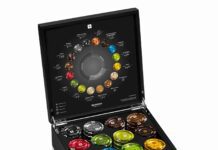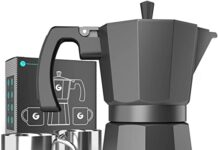Coffee lovers enjoy their morning cup of joe, but concerns about the safety of different parts of the coffee-making process can sometimes dampen the experience. One such concern revolves around the use of aluminum in making coffee. The question remains: is it safe to make coffee in aluminum? In this article, we explore the potential risks and benefits associated with using aluminum during the coffee-making process, shedding light on what coffee enthusiasts need to know. So, let’s grab a cup of coffee and delve into the world of aluminum and its impact on our favorite beverage.
Potential Health Risks of Aluminum in Coffee Making
Coffee making is a beloved ritual for many people, but it’s important to be aware of the potential health risks associated with using aluminum utensils in the process. Aluminum toxicity, aluminum leaching, and the link between aluminum exposure and Alzheimer’s disease and dementia are among the concerns that need to be considered. Additionally, the risk of neurological disorders and impaired kidney function should not be overlooked. Furthermore, aluminum’s impact on bone health is a growing concern. In order to fully understand these risks, it is necessary to examine the factors that affect aluminum leaching in coffee making.
Factors Affecting Aluminum Leaching
When it comes to aluminum leaching in coffee making, several factors come into play. The acidity of coffee is known to increase the leaching of aluminum from utensils, so it is important to pay attention to the type of coffee being brewed. Additionally, the brewing time and temperature can also influence the rate at which aluminum leaches into the beverage. Finally, the quality and type of aluminum utensils used play a pivotal role in determining the amount of aluminum that ends up in the coffee.
Aluminum vs. Stainless Steel Coffee Makers
To mitigate the potential health risks associated with aluminum, many coffee lovers turn to stainless steel coffee makers. Comparing the safety of aluminum and stainless steel coffee makers reveals that stainless steel is generally considered to be a safer option. Stainless steel ensures minimal leaching of metals into the coffee, providing a more worry-free coffee brewing experience. Moreover, stainless steel coffee makers are known for their superior heat distribution and retention properties, offering some distinct advantages over their aluminum counterparts. The longevity and durability of stainless steel also make it an attractive choice for coffee enthusiasts seeking a long-lasting brewing solution.
Pros and Cons of Brewing Coffee in Aluminum
Aluminum coffee makers do have their advantages. One of the most notable benefits is their affordability, as aluminum utensils tend to be less expensive than their stainless steel counterparts. Aluminum is also a lightweight material, making it easy to handle and transport. However, aluminum coffee makers do come with some drawbacks. The potential health risks associated with aluminum leaching cannot be ignored, and this alone might be enough to dissuade some individuals from using aluminum utensils. Additionally, over time, aluminum coffee makers may experience wear and tear, affecting their overall performance and durability.
Recommended Precautions for Brewing Coffee in Aluminum
For those who still prefer to use aluminum cookware for coffee making, certain precautions can help minimize the potential health risks. Using high-quality aluminum cookware is crucial, as this reduces the chances of aluminum leaching into the coffee. Additionally, opting for aluminum cookware with a protective coating provides an extra layer of defense against metal leaching. It is also advisable to avoid storing brewed coffee in aluminum containers, as this can further enhance the leaching process. Lastly, regular cleaning and maintenance of aluminum coffee makers can prevent the buildup of residue and decrease the risk of ingesting excessive amounts of aluminum.
Best Practices for Reducing Aluminum Exposure
To minimize overall aluminum exposure, it may be worth considering alternative coffee brewing methods. Glass coffee makers are a popular choice as they eliminate the concern of metal leaching altogether. Ceramic coffee makers are another viable option, as they provide a safe and durable alternative to aluminum utensils. Plastic coffee makers, while lightweight and portable, may not be preferred by some due to concerns about potential chemical leaching. Ultimately, the choice of alternative coffee brewing method will depend on personal preference and priorities.
Conclusion
While the safety of making coffee in aluminum utensils remains a topic of debate, it is important to be aware of the potential health risks associated with aluminum exposure. Factors such as aluminum toxicity, aluminum leaching, and their potential connection to Alzheimer’s disease, dementia, neurological disorders, impaired kidney function, and bone health concerns are worth considering. Stainless steel coffee makers offer a safer alternative, with superior heat distribution and retention properties. However, for those who choose to brew their coffee in aluminum, taking precautions such as using high-quality cookware, opting for a protective coating, avoiding coffee storage in aluminum, and regular maintenance can help mitigate the risks. Exploring alternative coffee brewing methods, such as glass or ceramic coffee makers, can also be a practical way to minimize aluminum exposure. Ultimately, the decision on how to brew coffee safely lies in the hands of each individual, taking into account their personal health concerns and priorities.































